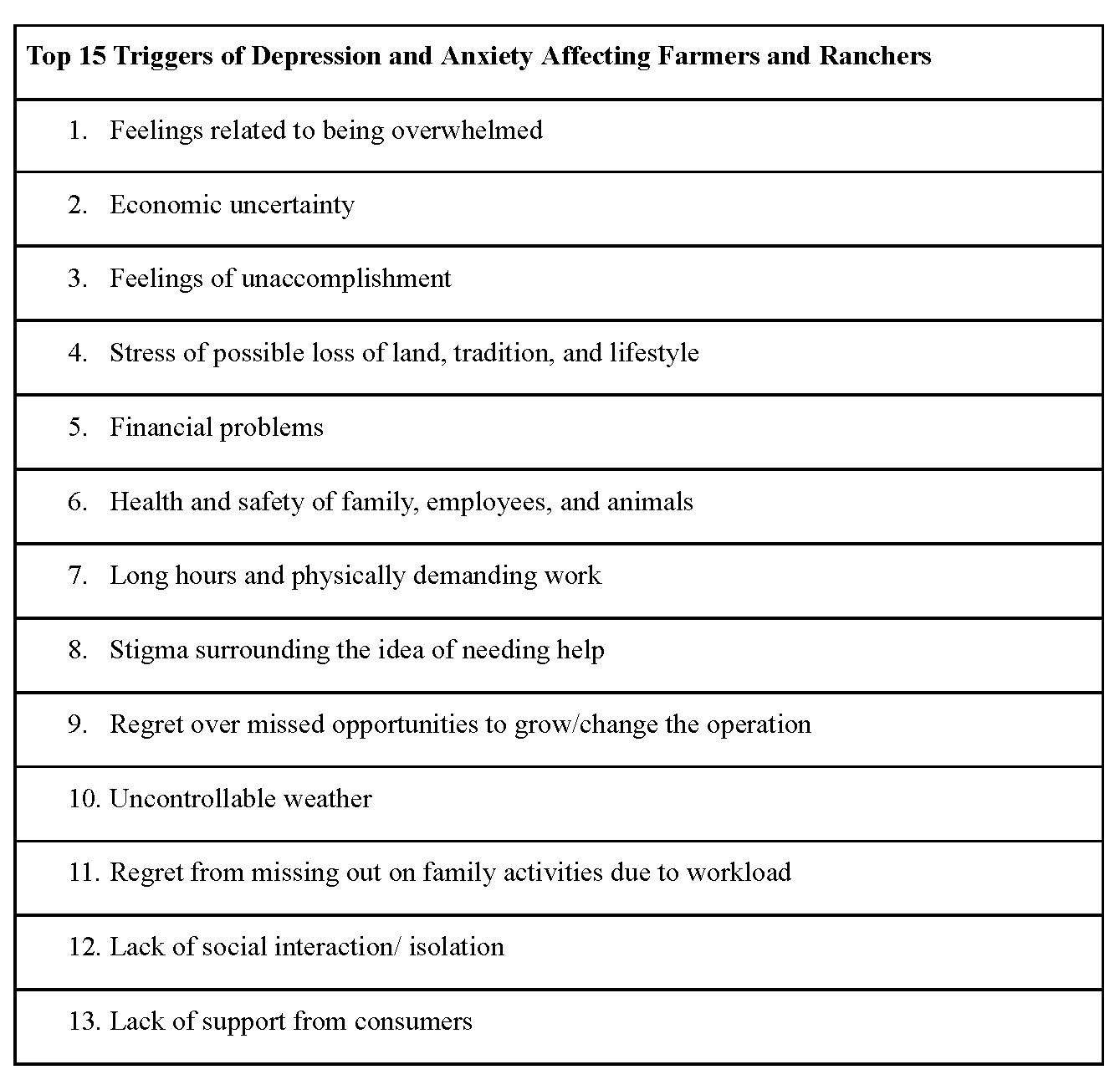The Silent Battle We Cannot Afford to Lose
Author
Published
5/16/2024
Depression. Anxiety. Mental Illness. Three topics, four words that are not mentioned near enough in the ag industry today.
As you likely know, farmers and ranchers have a very unique occupation, full of risk unlike any other job. It is a business largely influenced by factors that are beyond a farmers’ control. From ongoing struggles like unpredictable weather to increasing input costs and decreasing profit margins, it cannot be argued that farmers and ranchers are stressed.
Having witnessed firsthand the challenges of mental illness within the agriculture community, I felt compelled to explore the most common triggers for these mental health issues. During my time in FFA and for my agriscience fair project, I developed a survey aimed at determining the causes of depression and anxiety episodes among farmers and ranchers.
The survey, constructed with extensive research, featured a 10-point scale for respondents to rate the severity of various triggers affecting their daily lives. Additionally, demographic questions were included to ensure the reliability of the data collected.
Distributed through social media platforms, the survey garnered an overwhelming response. Over a span of one week, 415 respondents from 46 U.S. states, five Canadian provinces, and three countries participated. The data collected not only shed light on the prevalence of mental illness in agriculture but also validated the reliability of the survey.
Of the respondents, 73% reported experiencing depression, while 91% suffered from anxiety, with 64% facing both conditions. This underscores the interconnectedness of depression and anxiety among farmers and ranchers.
72% of farmers and ranchers were shown to deal with mental illness daily or weekly, debunking the notion of "winter blues" and highlighting the persistent nature of these challenges and proving that this epidemic is a problem affecting lives on a regular basis. The stigma surrounding mental illness often leads farmers and ranchers to downplay its severity, while others may unintentionally exaggerate it due to incomplete understanding.
Exactly half of the respondents assessed their own mental health, while the remaining 50% evaluated a family member or coworker. This balance strengthens the data's credibility by incorporating perspectives from both those experiencing the condition and observers. Notably, 56% of respondents were full-time farmers or ranchers, and 30% were described as a part time farmer/rancher, affirming the relevance of the data to the agricultural community.
Nationally, the American Farm Bureau's (AFBF) Farm State of Mind campaign found with multiple studies, that farmer suicide rates are 2-5x higher than the national average. Experiences such as natural disasters, extreme weather events, financial uncertainty, fluctuating markets, labor shortages, trade disruptions and other factors all contribute to extreme stress for farmers and ranchers who often live in a very isolated setting. Farm Bureau has been working with partners to help address mental health needs in agriculture and rural America.
Finally, after the data had proven to be reliable, the scores were tabulated and the rankings and severity of each of the triggers were determined and are listed below.

My aim in uncovering these triggers was to help farm families recognize and anticipate when their loved farmers and ranchers might require additional support.
To the families of farmers and ranchers dealing with mental illnesses: Together, we must confront the stigma surrounding mental illness, acknowledging its presence and impact in our families. Informing producer families about common triggers of depression and anxiety is crucial. By shedding light on these causes, we enable families to identify when additional support may be necessary, fostering open communication.
Through this research, families can now recognize triggers like feelings of being overwhelmed or economic uncertainty, paving the way for communication and proactive outreach. Simply lending a compassionate ear can make a world of difference to those struggling.
If outside families reach and despite daunting statistics, it is also important to highlight available resources. Programs like USU Extension's AgWellness offer podcasts, helplines, and connections to mental health professionals.
To farmers and ranchers grappling with mental illnesses: seeking help is not a sign of weakness. You're not alone, and reaching out to loved ones and seeking professional help is vital.
Depression and anxiety are real medical conditions that require attention. In some instances, severe mental health episodes may introduce thoughts of suicide. As mentioned, multiple studies show that farmer suicide rates are 2-5x higher than the national average. This is understandable but should not be taken lightly or ignored.
As an ag community, we can support our farmers and ranchers by being the support they need, offering a listening ear, advocating for accessible professional help, and most importantly, being their reason to stay.
Together, we can cultivate a culture of understanding and resilience in American agriculture.
For more information and some tips on recognizing mental health struggles and tips on how to help, visit the American Farm Bureau Federation’s ‘Farm State of Mind’ website.

Brinley Rhodes currently serves as a State FFA Officer, in the role of secretary. She is also a student at Utah State University.
Want more news on this topic? Farm Bureau members may subscribe for a free email news service, featuring the farm and rural topics that interest them most!
